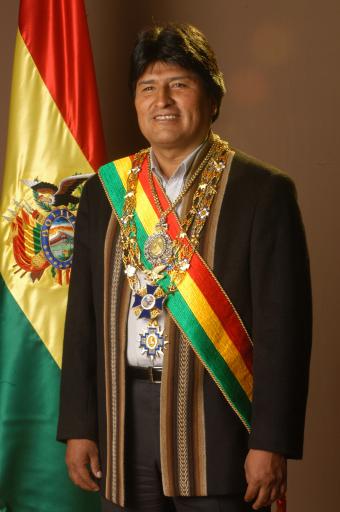PROVIDENCE, R.I. [Brown University] — Bolivian President Evo Morales, that country’s first indigenous head of state, will deliver a Stephen A. Ogden Jr. ’60 Memorial Lecture on International Affairs on Tuesday, Feb, 26, 2008. Morales’s address, titled “From the Andes: New Visions, New Voices,” will begin at 4 p.m. in Salomon Center for Teaching, Room 101. Doors will open at 3 p.m.
While in Providence, Morales will also meet with Brown students and faculty and hold discussions with the Bolivian community of New England. “As Bolivia’s first indigenous president, Evo Morales offers a unique perspective on Latin American affairs and on the effects of U.S. foreign policy in the region,” said Michael Chapman, vice president for public affairs and University relations. “I look forward to meeting him, welcoming him to the Brown campus and hearing his presentation as a distinguished Ogden lecturer.”Morales’s visit to Brown comes during a year when the University is hosting lectures, exhibitions, events, and film series with a focus on Latin American issues. The year’s inaugural event in October 2007 featured Fernando Henrique Cardoso, former president of Brazil, and Ricardo Lagos, former president of Chile, discussing social and economic inequality in Latin America. Lagos and Cardoso are professors-at-large at Brown, based at the Watson Institute for International Studies.
This month, Brown is also hosting ambassadors and other top government officials from Bolivia, Ecuador, and Venezuela for a conference titled “Changes in the Andes: Realities, Challenges and Opportunities for Inter-American Relations,” focusing on the rapidly changing political and economic landscape of the Andean Region. Additional events scheduled this spring include a visit and lecture by acclaimed Mexican writer, critic, and Brown professor-at-large Carlos Fuentes; a Brazilian Film Festival; the IV Transatlantic Conference at Brown; a concert of Brazilian music, and lectures by Antonio Patriota, the ambassador of Brazil to the United States, and Michele Pierre-Louis, the executive director of FOKAL, Haiti’s largest non-governmental organization. This year, Center for Latin America Studies is also celebrating its 25th anniversary as a center and 35th anniversary as an undergraduate concentration at Brown.
Morales was born in October 1959 to a poor Aymara family in the town of Orinoca in the Bolivian highlands. As a young boy he worked as an agricultural laborer and llama herder. To pay for his studies, Morales later worked as a brickmaker, baker, and musician.
Having left his formal studies at the Beltrán Ávila de Oruro high school, Morales began his political career in 1983 when he was named sports secretary for his union. Advancing rapidly, he was named secretary general in 1985, executive secretary of the Confederation of the Region in 1988, and president of the Coordinating Committee of Six Federations of the Region of the Chapare in Cochabamba in 1996. Morales was also active in political issues in Cochabamba, such as the controversy over water privatization in the region, which threatened to make water inaccessible to most of the poor population.
Morales became active in the national government in 1997, when he was first elected as a representative to the National Assembly. In the late 1990s, Morales became leader of a left-leaning political party, which won an astonishing 36 seats in congress in the 2002 elections. When Morales ran for president in 2005, he won with 53 percent of the vote. He has made redressing the effects of centuries of discrimination and oppression experienced by Bolivia’s indigenous groups a top priority of his presidency. Approximately 60 percent of Bolivia’s population is indigenous.
The principle measures of his government have been the nationalization of hydrocarbons, redistribution of land to indigenous peoples, and the installation of the Constituent Assembly.
Like many in his country, Morales views the coca plant as an important part of indigenous culture. In its natural form, coca is used by many Bolivians for medicinal purposes and is considered sacred, but it can also be refined to produce the powerfully addictive drug, cocaine. Morales has been an outspoken critic of U.S. drug policy and of U.S.-backed coca eradication programs, in favor of a drug policy that he believes does not harm the livelihoods and cultural heritage of small farmers.
Since 1965, the Ogden Lectureship has presented the University and its neighboring communities with 77 authoritative and timely addresses about international affairs. The lectureship was established in memory of Stephen A. Ogden Jr., a member of the Brown Class of 1960, who died in 1963 from injuries he suffered in a car accident during his junior year. His family created the series as a tribute to Ogden’s interest in the advancement of international peace and understanding.
Dozens of heads of state, diplomats, and observers of the international scene have participated in the series, including Queen Noor of Jordan, former President of the Soviet Union Mikhail Gorbachev, President of Brazil Fernando Henrique Cardoso, former Canadian Prime Minister Kim Campbell, media mogul Ted Turner, astronaut Sen. John Glenn, and economist Paul Volcker.

